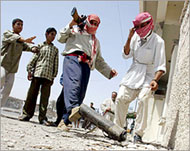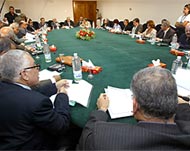Iraqi communists celebrate change
Although Iraqis were generally cautious about the strange and limited sovereignty delivered to them this week, many have celebrated a seeming step towards independence.

For Iraq’s communists, 28 June was a red-letter day. Outside the party’s office in Baghdad‘s Kahramana district, a dancing cheering crowd waved red flags as sympathetic passing motorists sounded their horns.
A posse of smiling security guards bearing AK-47s were a reminder, however, that not everyone in Iraq shares that sympathy and the country’s capital remains tense and dangerous.
That Iraq‘s biggest leftwing party – which still stresses its Marxist underpinnings – should celebrate the loosening of a conservative US government’s control over Iraq, will surprise few.
What is really surprising is that the two have been able to coexist for so long since the US-led invasion in April 2003. The ICP was the victim of a bloody CIA-backed purge in the mid-1960s – but following the invasion 40 years later, it joined the US-installed Iraqi Governing Council (IGC).
Against invasion
Long repressed by the former Baath government, the Iraqi Communist Party (ICP) welcomed Saddam Hussein’s removal and is happy that the ousted president is to be put on trial.
But it opposed the war, arguing that diplomatic means had not been exhausted. The ICP also argued against a prolonged occupation, calling for an interim government to be set up soon after the invasion to prepare quickly for elections and complaining the US-led occupation authority was dragging its heels.
 |
|
Shakir al-Dujaily says ICP wants |
“We were not easily received by the Americans at first,” says Shakir al-Dujaily, head of the ICP public-affairs committee, at his Baghdad office. Reaching his room takes me past security checks that would make an El Al flight-departure gate proud – three stages of frisking and armed guards.
Nevertheless, the communists pressed for inclusion in the IGC, a body created by the US and largely drawn from prominent Iraqi emigres, many of whom are now ministers in the interim government.
“We got the invitation to join at the last minute – 48 hours before the IGC was formed,” al-Dujaily told Aljazeera.net. “But we showed we were a strong force with the support of other parties and movements.”
Counterweight
US occupation officials subsequently said they were happy with the party’s behaviour, and their reception grew warmer.
This was partly because the ICP – Iraq’s oldest and broadest secular political group – was seen as a potential counterweight to less favoured, conservative Islamist organisations.
 |
|
The rise of religious forces makes |
One American supporter has been the National Democratic Institute for International Affairs (NDI), a private, taxpayer-funded group lead by the former secretary of state, Madeleine Albright, that aims to promote democracy abroad.
“At present, the ICP boasts the most significant organisational structure among all the secular parties,” NDI Middle East director Leslie Campbell was quoted as saying in the US media in January.
“The Americans hoped to use the communists as a counterbalance against the religious parties,” Abd al-Jabbar Ahmad Abd Allah, a political scientist at Baghdad University, said.
Significant voice
The ICP’s general secretary, Hamid Majid Musa, sits on the preparatory committee of a national conference to be convened later this month, which in turn will select advisers to the interim government.
|
“At present, the ICP boasts the most significant organisational structure among all the secular parties” Leslie Campbell, |
Around 10% of the conference delegates will represent democratic secular leftists, Al-Dujaily says, which in Iraq‘s fractured political landscape constitutes a potentially significant voice.
Abd Allah argues the rising popularity of the religious parties has so far limited the impact of the once-strong ICP, whose true level of support will remain uncertain until elections due early next year.
But following those elections, communist parliamentarians will have some influence on legislation – especially if they join a coalition government, Abd Allah says. And as social conditions improve in post-war Iraq, support for religious parties may lessen.
‘Major step’
The ICP is not entirely happy with the post-war situation, displeased that despite the official handover of sovereignty to the interim government on 28 June, more than 150,000 US-led troops remain in Iraq.
 |
|
Communists asked for – and got – |
“We have legal sovereignty and it’s a major step towards regaining effective sovereignty,” says al-Dujaily. “Working with other parties, we will do our best to clear the country of foreign forces.” He wants the US-led army to withdraw by the end of the year.
The planned privatisation of the Iraqi economy is another bone of contention. Critics say the Bush administration is using privatisation to help US companies already enjoying multi-billion-dollar Iraqi reconstruction contracts, grab more slices of Iraq‘s economic pie.
“We welcome foreign investment to help rebuild the country but strategic economic decisions should be left to an elected national government,” al-Dujaily says, adding that the ICP will seek to reverse the privatisation process.
Chequered past
Formed in 1934 with roots in the poor, mainly Shia Muslim areas of southern Iraq, the ICP expanded northwards to wider rural communities, trade unions and the middle class during the 1960s.
|
“We welcome foreign investment to help rebuild the country but strategic economic decisions should be left to an elected national government” Shakir al-Dujaily, |
The 1958 revolution heralded a decade of political strife and the ICP became the target of a CIA-backed purge following a 1963 coup.
Its political fortunes improved when the Baath party took power in 1968, and two ICP leaders joined the cabinet in 1972. But the Baathists, now led by Saddam Hussein, turned on the ICP after 1978 and many communists were killed.
Al-Dujaily denies that the history of the ICP, as well as its present involvement with the interim government, shows it has abandoned principle for power.
“We distinguish between ideology and politics. Yes, we engaged with the Baath party between 1968 and 1979 – but we engage with all national fronts. We’re part of the government now but we will criticise negative aspects and welcome positive policies.”
For now at least, there’s no mistaking Iraqi communists’ mood. Outside the ICP’s office in Baghdad on 28 June, among those celebrating the power handover was a 20-year-old party member, Ahmad. Above the din of beating drums and joyous chanting, he yelled, “We’re happy, we have independence.”